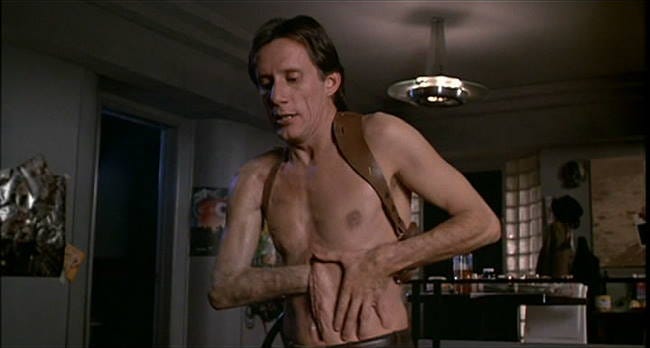Tox Report 61. Faceshopping, unwomanning and eunuch Videodrome
Plus: listen to me talk about Nazis on Barpod!
Welcome to Tox Report, and a very big hello if you’ve just joined from
or ! It was a lot of fun to record an episode of the only podcast. Katie is the epitome of low-drama competence off-mic and high-lols competence on-mic, and the story I got to tell is something I’ve been personally obsessed with for a few months. (It’s paywalled though, so if you’re not already a BarPod primo, now is your time.) In this week’s newsletter, I’ve accidentally written all about identity again — but first, a few more thoughts on that BarPod story.The case of Power and Miller v Turner is, on the face of it, one of those situations where everyone could have benefited from being less online — both Power and Miller, who seem to have been intoxicated with their edgelord power to cause distress, and Turner, who became a more enticing target every time he responded. The moral would appear to be, neither a lolcow nor a poo-toucher be (and if you understand that phrase, my commiserations: you are terminally online and your prognosis is hopeless).
But it’s also stranger than that. How did Power and Miller, as supposed free speech advocates, make the decision to sue for defamation over a content note? And what, ultimately, do Miller and Power really believe? It strikes me as bizarre to simultaneously claim for yourself the right to use symbols void of meaning (“chill out bro, it was just a meme”) while simultaneously demanding that your opponents be held legally responsible for harm caused by their own words. You can view that as an intellectual error, or you can view it as an assertion of power: it’s helpful to remember that the authoritarian predisposition cuts across the left/right divide.
The politics of neoreactionary meme culture are the politics of purposeful unseriousness, but unseriousness has had a place in the hard-right arsenal since long before image boards began to propagate groypers. “Never believe that antisemites are completely unaware of the absurdity of their replies,” wrote Sartre. “They know that their remarks are frivolous, open to challenge. But they are amusing themselves, for it is their adversary who is obliged to use words responsibly, since he believes in words.”
A reminder that Toxic is now available in paperback! It’s the story of how the internet drove everyone crazy in the noughties, told through the lives of nine celebrity women and the battle to own their own images. Helen Lewis called it “a molotov cocktail hurled at the feet of celebrity culture”, and Paris Hilton liked it so much she bought the TV rights. Click the button below to buy from Amazon, or head to your bookseller of choice.
And if you’ve read and enjoyed Toxic, please use those links to leave a review! It really does make a difference, and I appreciate everyone who’s done this already.
Listened
Sophie, “Faceshopping”
Brat summer is probably introducing a lot of people to Sophie for the first time, via Charli XCX’s elegy “So I”. Hyperpop producer and songwriter (and regular Charli collaborator) Sophie died in 2021 after an accidental fall; Charli’s song is both emotionally direct and full of ambivalence: it’s about rivalry, influence and the right to feel loss when you fear you (at least partially) rejected someone in life.
My own favourite Sophie song is this one, which is weird and abrasive and both very personal and completely depersonalised. It came out in 2018, a year after Sophie had publicly embraced a transgender identity — but “identity” in the extremely manufactured genre of hyperpop is a fragile, artful thing.
In a digital world, the “you” that exists is an invention. The voice is distorted to the point of total dislocation from the body; the self manipulated and commodified until it’s entirely displaced by the avatar. “My face is the front of shop/ My face is the real shop front/ My shop is the face I front/ I’m real when I shop my face,” sings Sophie in “Faceshopping”, like a product acquiring consciousness.
Watched
I Saw the TV Glow (general release)
Back in February, I wrote about Jane Schoenbrun’s debut feature A Self-Induced Hallucination — a found-footage journey through the Slenderman mythos, which was really about how humans invent their own reality and then destroy themselves in the process. But not long after making this movie about how fiction subverts the material world, Schoenbrun — who was Dan at the time — was absorbed into what I consider to be another form of the same phenomenon. Schoenbrun began to identify as “transfeminine nonbinary”, hence the name change to Jane.
And even if Schoenbrun hadn’t described new feature I Saw the TV Glow as an “egg-crack story” (“egg” being trans subculture slang for a person yet to realise that they’re trans) it would be pretty obvious that it’s a film about gender identity. Justice Smith is Owen, a stilted, awkward kid who finds kinship with an older girl called Maddy (Brigette Lundy-Paine) through a Buffy-like supernatural TV show called The Pink Opaque. (The TV-show-within-the-film sections are pleasingly done, but I also found myself infuriated by the stupid, network-TV-repellent name. The execs would simply have insisted on calling it the nearest possible thing to Hot Girls Fight Demons.)
This is a movie that is obsessed with media — the high school Owen and Maddy (rather improbably given they both look about 27) attend is given a name beginning with V, so Schoenbrun can splash the initials “VHS” all over the sets. This is too cute for my palate, and the film suffers a lot from belabouring its hand-tips at the expense of telling the story. But because this is Schoenbrun, the fiction refuses to remain safely apart from the real, and they bleed into each other while Owen grows ever more inarticulate and sad as he denies his “true self”.
It climaxes (spoiler!) in Owen, finally doubtful of the truth of his own existence, taking a boxcutter to his torso and slicing himself open to reveal… nothing but glowing white light. To me, this read as a pretty clear reference to Videodrome (the best film that isn’t Robocop), and the ersatz orifice which opens up in protagonist Max’s torso after exposure to the sinister videodrome signal via cable porn — especially because, like Videodrome, a great deal of I Saw the TV Glow involves watching the characters watching television.
But while Videodrome’s fantasy of mutation is visceral and obscene, I Saw the TV Glow’s is bloodless and asexual. I texted a friend that Schoenbrun’s film was “Videodrome for eunuchs”, and maybe that’s a success rather than a failure (albeit this film is mostly failures): never mind “long live the new flesh”, in 2024 it seems difficult enough to hang onto the idea of the old flesh having any substance. Or at least, difficult for people of Schoenbrun’s generation (also my generation) who had their idea of selfhood smashed up by the seductions of a pristine online identity made of light flashing through fibre optics.
Read
Jenny Turner, “As Many Pairs of Shoes as She Likes”, LRB
I came across this 2011 essay on feminism while I was researching Nina Power for BarPod (she’s mentioned, in light of her book One Dimensional Woman), and though I remember reading it when it was published, I had not remembered just how sneering, cruel and anti-feminist it is. The hardest gut-punch is the dismissal of Andrea Dworkin’s essay about being raped as “ghastly” — I wrote in Toxic about the incredible rush to trash Dworkin posthumously, but this is a particular brutal example.
Turner also dismisses the anti-pornography activists of UK Feminista and Object as “the white middle-class brigade” who are “having their genteel shout”. This isn’t because she can make a case for pornography as a social good (Turner doesn’t even attempt that): it’s purely because she thinks activists would be better concerned with “Chicken pieces, iPods, A-level burb girls with jobs in Selfridges, unable to buy any of the stuff they sell,” which is a basically unintelligible sentence out of context and not much clearer in the running copy, but seems to mean that animal rights and economic precarity would be better causes to embrace.
Not that Turner seems particularly invested in those subjects herself: they are simply “whatabouts”, a means to cast feminist politics as trivial and silly. And then, because Turner doesn’t seem to feel she’s done a thorough enough job, she goes on to attack the fundamental idea that women share anything as a class. After all, some women are poor, some are black, some live in third world countries, so how can there be a gender politics encompassing all these groups?
Never mind, I think sourly from thirteen years on, the racism of porn, the sexual exploitation of the poor. How can Turner adopt an invisible hand defence of extreme porn in one paragraph — “It’s a free-market economy out there, so of course there’s going to be violent pornography” — and then come on the Marxist a few hundred words later? Because the principle is not the point. The point is, in fact, to undermine the feminist project by any means necessary. If Turner can disaffiliate from other women hard enough, maybe the thinking is she won’t be treated badly in the same ways as them.
One of the things people ask me often is, why did women adopt gender identity politics? This essay is from a few years before trans issues became the hot button issue, but I think it holds some of the answers. For Turner, the political class of “woman” is full of shame and cringe: victims like Dworkin with their embarrassing insistence on talking about men’s violence, regrettable young women failing to be chill about sexual abuse as entertainment. Only the sad persistence of the female body stands between Turner and her hopes of freedom from being associated with such gaucheness. It is a mode of thinking that seems to be waiting for the logic of gender identity to make it make sense.
Gimme, gimme more…
Ian Leslie’s list of thoughts about friendship (Substack) has some great insights, and I especially liked his observation on the pleasure of weak ties (“The worst thing about the pandemic was not seeing the people I used to see infrequently”), probably because I think Ian and me probably fall into that category for each other, and I had a very nice time catching up with him after the London BarPod event last week.
My diary column for the Critic, in which I learn to fire a shotgun, is now online!
I’ve belatedly started Tortoise’s podcast The Master, on the sexual abuse allegations against Neil Gaiman (allegations denied by Gaiman). It’s all the more powerful for being precise about the complex and complicit psychology of grooming (as some of Gaiman’s accusers frame their experience).
I am bereft without the Olympics, but they ended on a a high with Emily Campbell taking bronze for Team GB in the women’s +81kg weightlifting (my favourite sport, of course). Her joy at nailing a lift is truly inspirational.








I really enjoyed your BarPod episode and I hope they invite you back 🙂
My god! Another couple of entries into my lexicon of words used to describe crossdressing and crossdressers 😆 This genre has surely the most descriptors, most of which I don’t understand. Every day truly is a school day!